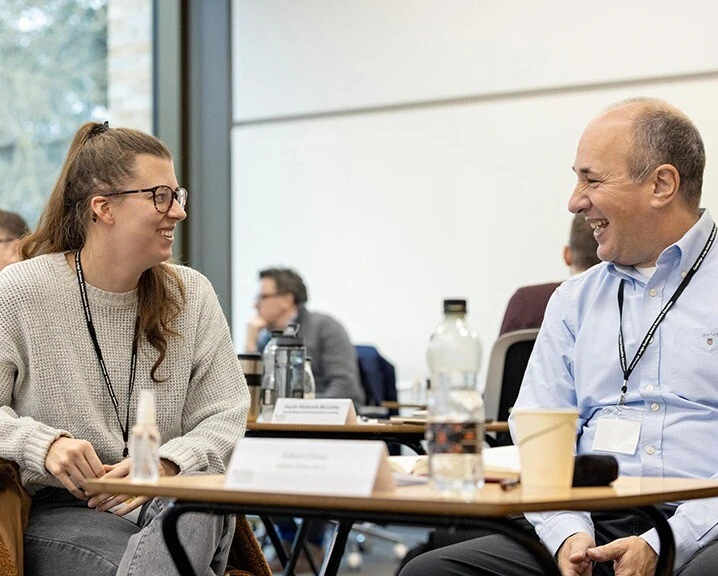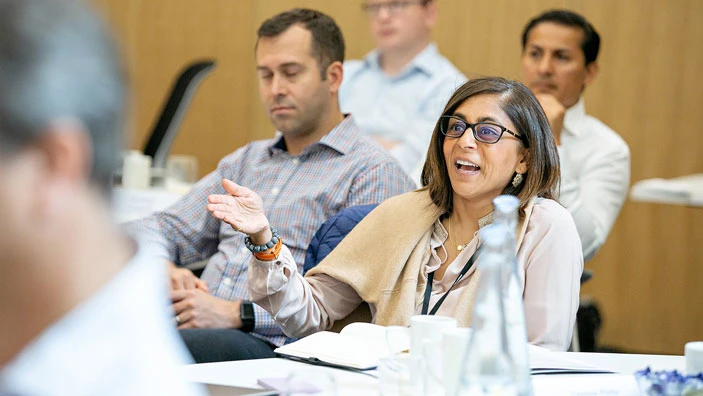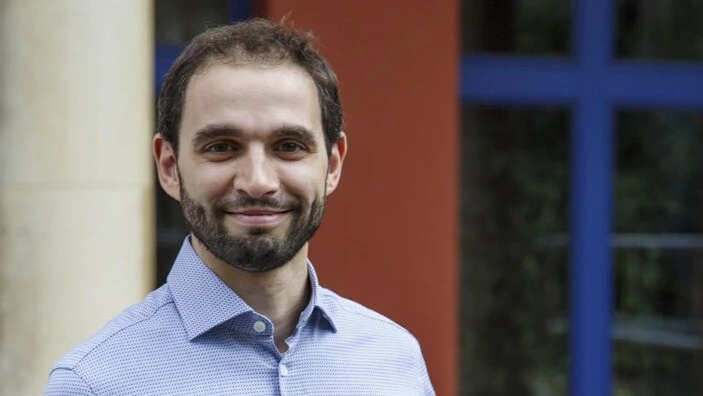Leading in a Changing World: Navigating Global Megatrends for Strategic Advantage
Explore the megatrends that are shaping the global economy.
Upcoming programmes
Format:
Dates:
Duration:
Fees:
Face-to-face
9-11 Mar 2026
3 days
£4,600 + VAT
Upcoming programmes
Format:
Face-to-face
Dates:
9-11 Mar 2026
Duration:
3 days
Fees:
£4,600 + VAT
Overview
This programme considers some of the major shocks and contemporary long-term global challenges facing countries, companies and individuals. It evaluates the causes and consequences of such challenges and considers what they mean for economic growth and corporate strategy. Each challenge will be analysed in 3 parts.
- Global perspective: the cause and consequences of the challenge.
- National perspective: implications for countries including economic growth.
- Corporate perspective: the opportunities and threats for business.
Benefits and career impact
- Explore the most long-term megatrends that are shaping future of the global economy to interpret current events accurately. Gain a deeper understanding of the economic, political, and social factors that impact businesses globally.
- Make better decisions and formulate strategies that align with global trends and challenges that affect you industry and how they can best position their organisation to thrive in this environment.
- Develop new skills and knowledge in areas such as global leadership, technological changes, public policy and strategic thinking. These skills can lead to improved performance and productivity.
- Gain valuable opportunities to network and exchange ideas. Participants can learn from each other’s experiences and build relationships that may lead to future collaborations.
- Leaders can gain a better understanding of the external factors that can impact their business. This knowledge can help you develop more informed and effective strategies that align with the evolving global landscape.
- By gaining exposure to new ideas and approaches through the course, leaders can stimulate innovation within the organisation. They may be able to identify new opportunities or adopt new practices that can help the organisation adapt and thrive in a rapidly changing environment.
- By analysing global trends and challenges, companies and organisations can stay ahead of the competition.
- Companies and organisations that are able to respond quickly and effectively to global trends and challenges are more likely to succeed in the long run.
My name is Michael Kitson. I’m an economist at Cambridge Judge Business School. My research focuses on understanding the dynamics of technological change, productivity, and economic growth. To thrive in this rapidly changing global environment, organisations must be proactive in understanding emerging trends and threats and respond effectively to stay competitive. So this programme is aimed at C-suite leaders, corporate strategists, business heads, and aspiring managers transitioning into leadership roles as they are pivotal in driving their organisations forward and seizing global opportunities for growth.
The programme will include face-to-face teaching and intensive classroom learning experience, including interactive lectures, panel discussions, and Cambridge debates; you will be engaging directly with our faculty in Cambridge and your peers. Conversations spill over into break times and meals, forming lasting connections. You will share your ideas, develop your network, whilst enjoying the historic city of Cambridge.
The programme considers some of the major shocks in contemporary long-term global challenges facing countries, companies, and individuals, megatrends representing large-scale and transformative forces that shape societies and economies. They have a profound impact on businesses and organisations across various sectors. Understanding and responding to these megatrends is crucial for us to seize opportunities and mitigate potential risks.
Learn more about the programme from our faculty, Michael Kitson
This programme became a valuable tool for gaining a better understanding of various emerging megatrends. Moreover, the programme encouraged you to think how to protect your business from potential upcoming threats and how to take advantage of new business opportunities.
Programme content
Module 1: Global megatrends
- Explore the major merging global challenges or megatrends which are impacting business and public policy: climate change, technological change, demographic shifts, inequality and deglobalisation.
- Analyse global trends and challenges to stay ahead of the competition.
- Strategic decision-making: Developing frameworks for recognising, assessing and managing the impacts of systemic megatrends.
- Consider how rapid changes in global markets, political relationships and technologies are impacting Global Economic Performance.
- Long-term impacts of growth, public policy and business performance. What will the world look like in 2050?
Module 2: Climate change and transition to net zero
- Understand the challenges of climate change for businesses and governments.
- Identify strengths and weaknesses of your organisation’s response to energy transition.
- Articulate the future direction of energy and climate policy and how firms can navigate this fast-changing environment.
Module 3: Diversity, equity and inclusion
- Explore the common pitfalls and the best practices in terms of diversity, equity and inclusion, how to implement changes in your organisation, and how to avoid unintended consequences
- Develop a robust understanding of both the individual factors and the organisational practices that lead to discrimination.
- Design and implement the most effective diversity, equity and inclusion policies and initiatives.
Module 4: Globalisation and deglobalisation
- Consider the process of globalisation and whether it is going into reverse.
- Understand the impact of deglobalisation on international trade.
- Discuss the rise of protectionism and the development of fragmented and isolated markets, and the possible entry modes to enter difficult markets.
- Experience a ‘globalisation debate’, in which the case for and against globalisation will be examined.
Module 5: Sustainable business models and stakeholder governance
- Identify key aspects of an ESG-informed stakeholder management approach.
- Unpack the topic of “externalities” – the environmental and societal costs of business – and how they are affected by stakeholder orientation.
- Discuss how to overcome greenwashing through ESG management and stakeholder governance
Module 6: Economic and business implications of Artificial Intelligence (AI)
- Explore the economic and business implications of AI and how it can add value to your organisation.
- Articulate the impact new technologies such as robotics and AI can have on individuals, businesses and nations.
- Understand the driving forces of digital and AI transformation in sustainable marketing.
- Learn how to use digital and AI technologies and tools to lead sustainability innovation.
Module 7: Inequality and demographic change
- Understand the challenges of an increasing retired population and a reduced workforce.
- Articulate how organisations will compete for talent to meet the demands for health and social care.
- Debate the alternative approaches to addressing inequality and the implications for businesses and organisations.
Module 8: Future of work
- Evaluate approaches for leading and navigating uncertainties surrounding the future of work.
- Identify which jobs will be replaced and where new jobs will be created.
- Explore how to navigate pressures and choices facing leaders, and the tools at your disposal to create a future of work that works for people, organisations, and societies

How you learn: Face-to-face
Face-to-face is a traditional, intense classroom learning experience and is all about hands-on interaction. You will be a part of exercises, debates and conversations, engaging directly with our faculty and your peers. Conversations spill over into breaktimes and meals, forming lasting connections. Share your ideas, develop your network and grow professionally, whilst enjoying the historic city of Cambridge.
Who attends
- Business leaders seeking to deepen their knowledge of global trends and ensure their organisation can identify and benefit from global opportunities for growth.
- Corporate strategists and department heads who need to understand global trends and assess their impacts on their teams.
- Managers seeking to transition into senior leadership roles and who will be required to take their organisations forward in the medium to longer term.

A hands on educational experience: learning from subject experts and fellow senior executives from all around the world – I strongly recommend this programme.
Faculty and speakers
Learn from our world-class faculty who bring fresh insights from their leading-edge research into all of our Executive Education programmes. The Academic Programme Director (APD) for the Leading in a Changing World programme is Michael Kitson.
Assistant Director of the Centre for Business Research (CBR)
PhD (University of Michigan)
PhD (Massachusetts Institute of Technology)
PhD (HEC Paris)
MPhil, PhD (School of Management, Fudan University)
PhD (HEC Paris)
Why Cambridge Judge Business School?
Related programmes
Leading in a Changing World: Navigating Global Megatrends for Strategic Advantage belongs to our Managing Organisations executive education programmes. Here are a selection of other Managing Organisations programmes:
Leading Strategic Projects Successfully
Learn to embed projects within an organisational context, mastering complexity and uncertainty, managing stakeholders and leading and motivating your teams.
Strategic Decision-Making for Leaders
Learn to think strategically, lead through uncertainty and improve the quality of your decision-making at every level.
Steering Complex Projects
Gain the confidence and expertise to take on novel and multifaceted projects in your organisation factoring in key issues such as strategy negotiation and incentive structures – all within a wider strategic context.
Speak to a programme advisor
If you have any questions or would like to discuss how this programme could benefit you or your organisation, please get in touch with the programme advisor.


















